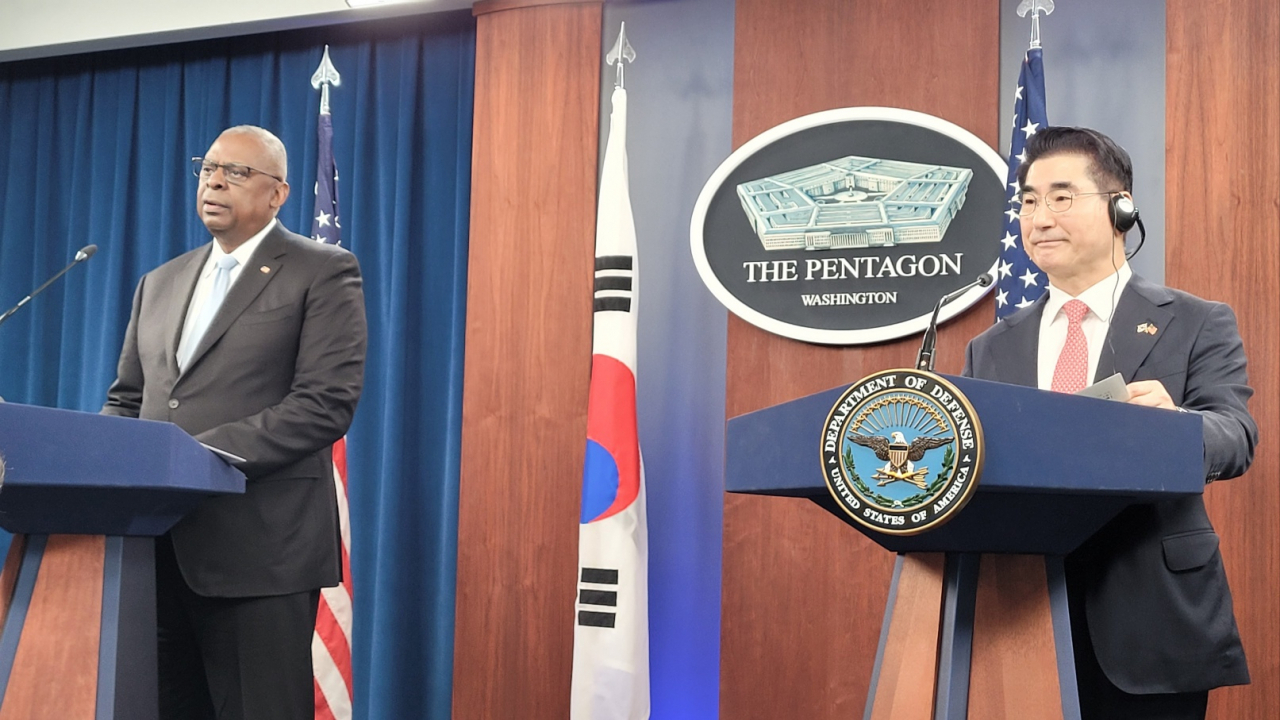
The defense chiefs of South Korea and the United States condemned North Korea's troop deployment to Russia in the "strongest" terms with "one voice" as they held the allies' annual defense talks at the Pentagon on Wednesday. Defense Minister Kim Yong-hyun and US Secretary of Defense Lloyd Austin issued the condemnation at the 56th Security Consultative Meeting (SCM) as Seoul and Washington have confirmed the troop deployment, which is feared to escalate Russia's war in Ukraine. "The two leaders also strongly condemned in the strongest terms with one voice that the military cooperation between Russia and the DPRK has expanded beyond transfers of military supplies to actual deployment of forces, and pledged to closely coordinate with the international community regarding this issue," the SCM joint communique read.
DPRK stands for the North's official name, the Democratic People's Republic of Korea. Kim and Austin made clear that military cooperation between Pyongyang and Moscow, including arms trade and high-technology transfers, constitutes a "clear" violation of U.N.
Security Council resolutions, and called on Russia to uphold its commitments. This year's SCM proceeded after Washington said that the North has thus far sent around 10,000 troops to eastern Russia with some of them having moved closer to Ukraine -- a development that both believe would have security implications for both the Indo-Pacific region and Europe. During the SCM, Kim and Austin agreed to incorporate "realistic" scenarios, including a North Korean nuclear attack, in the allies' future combined military exercises, hinting that Seoul and Washington could include such scenarios in their joint wartime contingency plans.
"Both leaders decided to continue strengthening combined exercises and training in line with the rapidly changing security environment of the Korean Peninsula, and further decided that future combined exercises should include appropriate and realistic scenarios, including responses to DPRK nuclear use," the statement said. It did not specify when the allies will start applying North Korean nuclear attack scenarios to future exercises. Albeit not explicitly expounded in the statement, the agreement signaled the prospects of Seoul and Washington adding nuclear-based scenarios to the wartime operational plans of the South Korea-US Combined Forces Command that are based largely on North Korean conventional attack scenarios.
Despite CFC war plans based on conventional warfare scenarios, Seoul has been reliant on Washington's "extended deterrence" commitment to counter evolving North Korean nuclear threats. The commitment is a US pledge to mobilize the full range of its military capabilities, including nuclear weapons, to defend its Asian ally. Last month, North Korea ratcheted up tensions by making a rare disclosure of a clandestine uranium enrichment facility.
Leader Kim Jong-un has also threatened to use nuclear arms if its enemies attempt to use armed force against it, though he said the North has no intention of attacking the South. During their talks, Kim and Austin also urged the North to respect the Northern Limit Line, a de facto inter-Korean maritime border, as the North Korean ruler depicted the NLL as a "ghost line without legal grounds" -- a characterization that stoked fears of Pyongyang's provocations around it. "Both sides noted that the Northern Limit Line has been an effective means of separating military forces and preventing military tension over the past 70 years," the statement said.
Pyongyang has long demanded the NLL be moved farther south as it was unilaterally drawn by the US-led UN Command after the 1950-53 Korean War. What's noteworthy was that there was no mention of the allies' shared goal of achieving the "complete" denuclearization of the Korean Peninsula in this year's SCM document. In previous communiques, Seoul and Washington referred to joint efforts to move toward that goal.
The defense chiefs condemned the North's tension-raising activities, such as multiple drone infiltrations in the past, as well as the recent unilateral detonation of sections of inter-Korean roads and ongoing launches of "filth and trash balloons." "(They) urged the DPRK to immediately cease such activities," the communique said. The two officials also endorsed the "Regional Cooperation Framework for US-ROK Alliance Contributions to Security in the Indo-Pacific," as Seoul and Washington have been striving to broaden the scope of their alliance beyond its focus on the Korean Peninsula.
ROK stands for South Korea's official name, the Republic of Korea. Highlighting the importance of science and technology cooperation, the defense chiefs decided to establish the "Defense Science and Technology Executive Committee" at a vice ministerial level before the end of the year. The committee is designed to guide and prioritize the alliance's defense technology cooperation.
They noted priority areas for cooperation, including autonomy, artificial intelligence and "crewed-uncrewed" teams, which are vital to ensuring South Korea is able to achieve its defense innovation goals and modernize alliance capabilities, according to the statement. (Yonhap).










